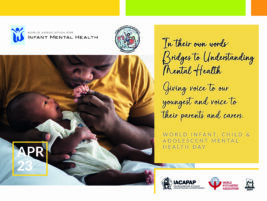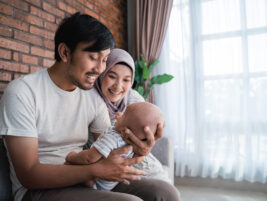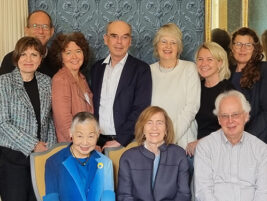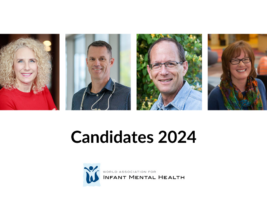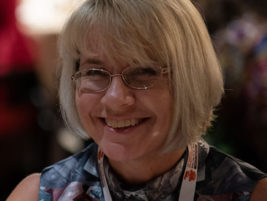I am currently the chair of the Affiliates Council and prior to this role I was the Affiliates Council representative (2010- 2014). In 2010, I was elected to this role with Prof Dr Martin St-André who was elected as the Affiliate Council Chair. Our task was to build on the vision of the WAIMH board. That is, the Affiliate Council is to advise and guide the WAIMH Executive Committee regarding the activities and needs of the regions served by WAIMH affiliates and those in the process of developing WAIMH affiliates. In 2014, Martin’s term finished and I took the role of chair and Anna Huber was elected as the AC representative. My term of office in this role will finish in 2018.
In addition, I am also the copy of editor of Perspectives in Infant Mental Health.
I am a past president (2009-2013) of the New Zealand WAIMH affiliate, IMHAANZ (Infant Mental Health Association of Aotearoa New Zealand). The current president of IMHAANZ is Dr Denise Guy. I have added a link here to IMHAANZ (www.imhaanz.org.nz).
My professional background is in social policy and social work (BSW, MPhil), psychodynamic child psychotherapy (PG Dip Ch Psych) and more recently organizational team management (PhD Management). Since 1995, my practice and ongoing trainings have been oriented towards working with families with infants and young children. I have worked in both the public and private sector as a psychotherapist, teacher and clinical supervisor. A mainstay of my practice has been conducting care and protection assessments and where possible working with families and the multi-disciplinary services involved in their care to support healing and family reunification. I have also been engaged with workplace team coaching.
As life weaves its way through paths that unfold one step ahead of where I am, I currently find myself living in Geneva, Switzerland. While my French is improving, I am not yet competent to practice any form of face-to-face client work in French. Instead, I am engaged with high performance team coaching. I am also currently engaged in a new project where I am setting up a new service for UN and NGO organizations who are writing and researching about social policy pertaining to children. The aim of the service will be to assist policy writers with ways to include the unique needs of infants and their families within their briefs, including the interdisciplinary and lifespan agenda of infant mental health.
While the contexts of my practice are now varied and diverse our field of infant mental health (IMH) remains an anchor for me. IMH as a theory and as a practice remains relevant and salient. In addition, IMH as a global community remains constant. Throughout my career, I have been influenced and continue to be challenged and stretched by many extraordinary people in our field (including esteemed published colleagues and friends, teachers, grass-roots practitioners and treasured clients). I am grateful and thankful to each one of them.
It’s always a risk to start naming names of key influences because it’s impossible to name everybody. So, I will limit my choice to one person, one key note presentation, one paper: Dr Daniel Stern, the clinical relevance of infancy: A progress report. While, I had read Stern’s work, I first heard him speak at the amazing WAIMH Congress held in Paris in 2006.
I arrived in a huge lecture room, jet lagged from my trip from New Zealand. I was feeling nervous and preoccupied about my pending poster presentation. My conference handbook was glowing on my lap from all the highlighter pen I had used to mark all the sessions I would attend; a pending feast of presentations from dawn to dusk. And then Daniel Stern began to talk.
As he spoke I was awake, present and blessed. He spoke of the new dance between the interpersonal, intersubjective and intrapsychic processes. He talked about the paradigm shift towards a twoperson psychology. He talked about what it means to experience triadic relationships in therapy. He talked about extended homevisiting programs as a preventive measure. He talked about implicit knowledge. At the end of his presentation he talked about the nonspecific factors of psychotherapy, such as taking the time to be with clients, and to really listen to them. He reported that these factors, above all of our other tools, assessments and theoretical orientations, are having the most effect in bringing about change and prevention.
I have returned, and returned again to the phenomenal memory of his presentation. This paper and the experience of listening to Daniel in Paris never grows old, never loses its zest. The challenges he posed to me as a practitioner and to our IMH community remain current. As a WAIMH member and as a Board member, I treasure the journey taken so far and look forward to the one ahead as we travel together to fulfil the goals and vision of WAIMH. You can access his paper from this talk in the Infant Mental Health Journal (Stern, D. 2008). The clinical relevance of infancy: A progress report. Infant Mental Health Journal, 29 (3), pp. 177–188).
Reflections: Professional and Personal. Maree Foley
Authors
Foley, Maree, PhD,
WAIMH Affiliates Council Chair ,
Switzerland



